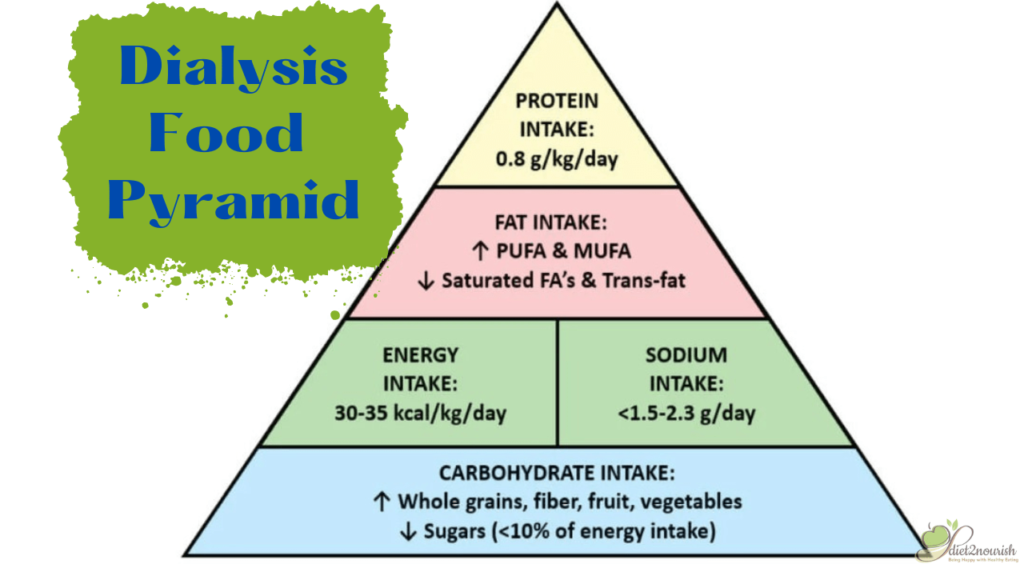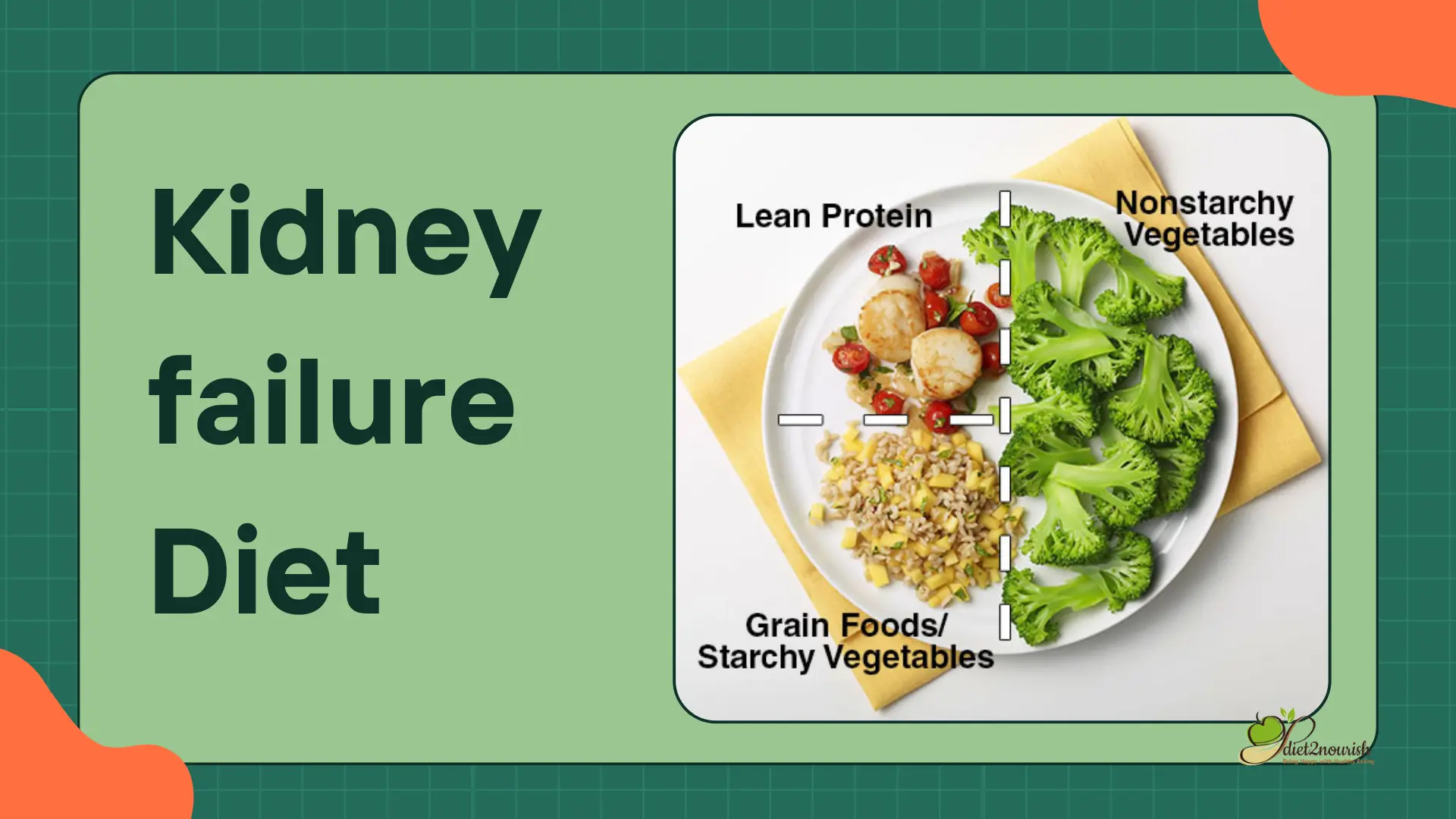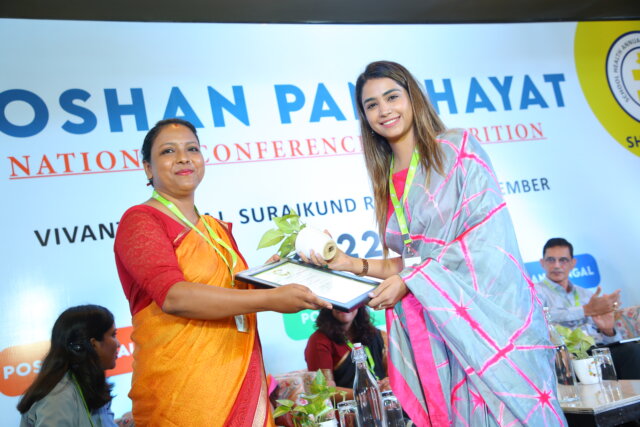Kidney failure Diet
The prime function of the kidneys is to remove waste and further fluid from your body through your pee. Maintain stability in your body’s minerals, like salt and potassium. Keep balance in your body fluids makes hormones that affect the other organs work.
But when you have kidney disease or failure, it’s important to have kidney failure diet plan to watch what you eat and drink as your kidneys can’t remove waste products in addition to they should.
So you think what should you eat that is easy on your kidney?
Here is a solution, you can follow a kidney failure diet plan that can help you to stay healthier and slow down damage to your kidneys. As everybody is different and has special vitamins or nutrient needs. So the best is to consult with a dietitian or experts to create a kidney failure eating plan which is proper for you. Now we will look into detail about the diet plan information.
What’s a Kidney failure diet plan?
A kidney diet eating plan is a way of eating that prevents your kidneys from more harm. It maintain nutrient, minerals required in the body and limit the items which is harmful for you.
The doctor may additionally suggest you choose meals that are easy on your kidneys. They could advise:
Cut the Sodium
This mineral is observed naturally in many ingredients. It’s mostly common in salt.
Sodium affects your blood pressure. It additionally enables you to preserve the water balance for your body. Healthy kidneys keep sodium ranges in check. However if you have CKD, extra sodium and fluids build up in your body. This may reason for some of the problems, like swollen ankles, high blood pressure, shortness of breath, and fluid buildup around your coronary heart and lungs. You should aim for less 3-4 grams of sodium in your everyday food diet.
Take some simple steps to reduce the sodium in your food plan:
• keep away from table salt and high-sodium seasonings (soy sauce, sea salt, garlic salt, and so on.).
• Have home food – as fast foods are high in sodium.
• Replace new spices and herbs instead of salt.
• Stay away from packaged ingredients, if possible. They tend to be excessive in sodium.
• Read the labels to pick out low-sodium ingredients.
• Rinse canned foods (veggies, beans, meats, and fish) with water before serving.
Restriction in Phosphorus and Calcium
You want these minerals to maintain your bones healthy and strong. When your kidneys are healthy, they put off the phosphorus you don’t need. But if you have CKD, your phosphorus ranges can get too excessive. This places you at the chance of heart disease. What’s more, your calcium levels start to drop. To make up for it, your body pulls it out of your bones. This may make them weak and easy in broken.
When you have last-level CKD, your doctor may additionally advise you to get no extra than 1,000 milligrams (mg) of phosphorus minerals every day.
You can try this with the help of:
• selecting meals with low levels of phosphorus
• eating more fresh fruits and veggies
• Have corn and rice cereals
• Drinking light-colored sodas
• Cut on meat, poultry, and fish
• Limit dairy and processed foods
Foods that are excessive in calcium also tend to be excessive in phosphorus. The doctor might propose you cut on calcium-rich foods. Dairy foods that are lower in phosphorus encompass:
• Brie or Swiss cheese
• normal or low-fat cream cheese or bitter cream
• Sherbet
Reduce Your Potassium consumption
Potassium is found in a lot of fruits and veggies, like bananas, potatoes, avocados, oranges, cooked broccoli, uncooked carrots, veggies, tomatoes, and melons. These foods can affect potassium levels in your blood. Your dietitian will assist you to know if you want to limit this mineral for your diet.
Low-potassium food items, like:
• Apples
• Cranberries and cranberry juice
• Strawberries, blueberries, raspberries
• Plums
• Pineapples
• Peaches
• Cabbage
• Boiled cauliflower
• Asparagus
• Beans (green or wax)
• Celery
Why is a kidney failure diet plan important?
A kidney-friendly diet plan helps you to control your kidney disease and gradual down damage in your kidneys. It does this by stopping certain minerals from building up in your body, that’s important as your kidneys do not work as well to remove waste products from your body.
A kidney diet plan also prevents different severe health issues and controls high blood pressure and diabetes, which could prevent kidney disease from getting worse.
It additionally ensures that you get the right stability of vitamins that will help you:
• Have the energy to do your everyday responsibilities
• save you from infection
• construct muscle
• Maintain a Healthy Weight
How can You follow a kidney failure diet plan?
Your kidney diet plan may change over time, but it will always check that you get the right quantity of these nutrients:
• Protein: one of the vitamins that offer you energy. Your body needs protein to grow, build muscle tissues, heal, and stay healthy.
• Fats: fat is some other one of the nutrients that give you power. Your body needs fats to carry out much work and maintain your body at the proper temperature.
• Carbohydrates or “carbs”: Your body’s primary supply of energy. Your body can more without problems convert carbs into power than protein and fats. Consult with your dietitian to have the proper kidney diet plan.

| Protein | Good choices include fish, chicken breast, and low-fat soy products as well as low-fat dairy products. |
| Fats | Healthy oils and fats are good choice for heart health for kidney patients. |
| Carbohydrates | Refined (any type of grain)Enriched (any type of grain)White flour. White rice.De-germed cornmeal. |
Food items for Kidney Patients:
• Cauliflower is rich in lots of nutrients, such as nutrition C, K, and B.
• Blueberries are loaded with multiple nutrients and antioxidants and save you from many fitness conditions, which include diabetes, heart ailments, and most cancers. This fruit is a high-excellent addition to your renal food due to the fact it’s low in sodium, potassium, and phosphorus.
• Sea bass makes a good supply of protein and omega-3 fatty acids.
• Egg whites are high in proteins and additionally make a renal-pleasant food.
• Garlic is a top alternative to salt and provides a scrumptious flavor to any food. Plus, it also comes loaded with nutrition B6, diet C, and manganese properties.
• Chicken (skinless) is low in sodium, phosphorus, and potassium compared to chicken with skin-on.
• Onions are top flavor enhancers, especially on the subject of a renal-eating regimen. Moreover, onions are good in B nutrients and manganese.
• Pineapple is a low-potassium fruit and a brilliant addition to a kidney-eating diet. Moreover, it is a great supply of fiber, vitamin C, bromelain, and manganese.
Can you get help to create a kidney failure diet plan that is right for you?
You can consult with Diet2Nourish dietitian about your meal Schedule. They may help you create a kidney-friendly eating plan that is proper and protective for your kidneys. Ask them before increasing or decreasing your daily intake of certain nutrients.
Diet Chart for the Kidney Failure Patients:
You can follow this diet chart and make addition in your food items as per this chart:
| Breakfast | 3 rice dosa+1/2 cup sambhar(100ml)(red gram dal-leached, onion, ladies finger, bottle gourd)+1tsp tomato chutney+1 cup toned milk/ 1 cup tea (100ml)4 rice Idly+ 1/2 cup sambhar (100ml)(red gram dal-leached, onion, ladies finger, bottle gourd)+1 tsp methi chutney+1 cup toned milk/ 1 cup tea (100ml)1 cup vermicelli upma+1 cup toned milk/1 cup tea(100ml)3 chapathi+ capsicum curry-1/2 cup+1 cup toned milk/ 1 cup tea (100ml)1 cup tomato rice + methi chutney- 2 tsp+1 cup toned milk/ 1 cup tea (100ml) |
| Lunch | 1 cup rice+2 chapathi+1/2 cup snake gourd dal(red gram dal leached in hot water for 2 hours)+1/2 cup cabbage(leached) sabji+ 1/2 cup curd1.5 cup rice+1/2 cup lauki dal(red gram dal leached)+1/2 cup bhindi(leached) sabji+ 1/2 cup curd1 cup rice+2 chapathi+1/2 cup mix veg sambhar(leached (red gram dal,ladies finger, bottle gourd), onion)+ 1/2 cup lauki sabji+ 1/2 cup curd.1 cup rice+2 chapathi+1/2 cup ridge gourd sabji+1/2 cup methi dal(both methi and red gram dal leached)+ 1/2 cup curd.1.5 cup rice+ 1/2 cup capsicum(leached) sabji+ 1/2 cup ridge gourd dal(red gram dal leached)+ 1/2 cup curd1 cup rice+2 chapathi+brinjal(leached) sabji+1/2 cup tomato dal(green gram dal leached)+ 1/2 cup curd1.5 cup rice+1/2 cup mix veg sambhar (leached(red gram dal),ridge gourd, snake gourd,bottle gourd)+1/2 cup ivy gourd(parmal) sabji+ 1/2 cup curd |
| Dinner | 1 cup rice+1/2 cup cabbage(leached) sabji1 cup rice+ 1/2 cup bhindi(leached) sabji1 cup rice+ 1/2 cup lauki sabji1 cup rice+1/2 cup ridge gourd sabji1 cup rice+ 1/2 cup capsicum(leached) sabji1 cup rice+ 1/2 cup capsicum(leached) sabji1 cup rice+ 1/2 cup ivy gourd sabji. |
Conclusion:
A diet plan chart for kidney patients is helpful to maintain their health and get relief from their kidney problems. But for better guidance consult with our experts. So that they make diet chart according to your body problems.
FAQ:
Diet plan which is rich in fruits, greens, low-fats dairy products, whole grains, fish, skinless chicken, beans, seeds, and nuts. It is low in salt and sodium, added sugars and sweets, fats and red meats.
The 2 common situations that have an effect on your kidneys are diabetes and excessive blood pressure. A balanced diet and ordinary workout can help maintain both under control. With diabetes, it is also important to keep an eye on your blood sugar and take insulin when you need it.
Keep away from processed foods and choose fresh fruits and vegetables. Follow with a low-salt food plan. Salt should be confined especially if you have high blood pressure, protein in your urine, or swelling, or problem in breathing.
Seven approaches to cleanse Your Kidneys and maintain proper Kidney health
1. Drink Water.
2. Low Sodium diet plan.
3. Maintain Blood pressure
4. Keep Healthy Body Weigh
5 Maintain Diabetes. …
6. Exercise
7. A Kidney diet plan.
.










